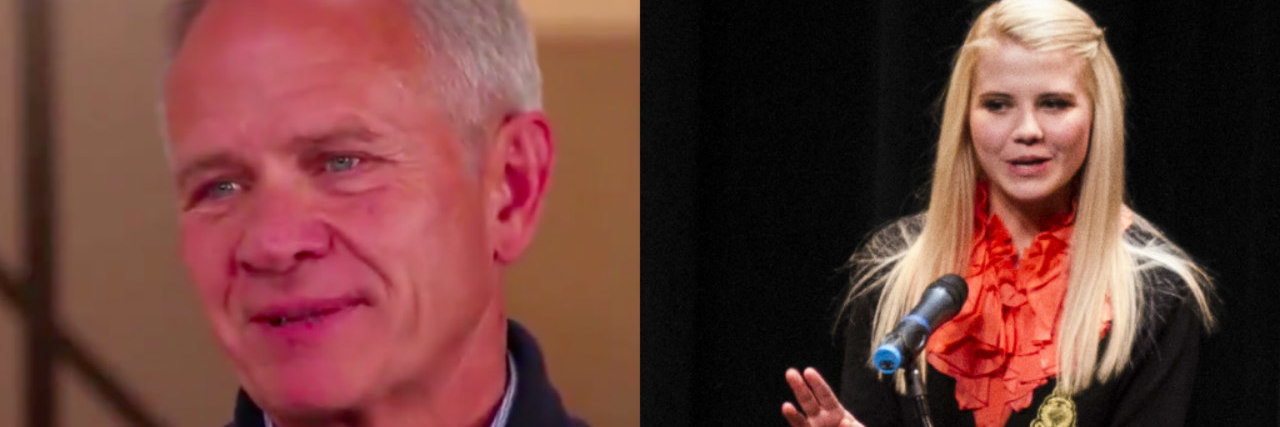Elizabeth Smart's Father Said Coming Out as Gay Was 'More Difficult' Than Daughter's Abduction
Editor's Note
If you’ve experienced sexual abuse or assault, the following post could be potentially triggering. You can contact The National Sexual Assault Telephone Hotline at 1-800-656-4673.
At a Utah conference over the weekend, Ed Smart, father of kidnapping survivor Elizabeth Smart, spoke publicly for the first time since coming out as gay in August. Smart, who grew up in the Mormon church, opened up about repressing his sexual orientation for decades.
“I was told [being gay] was being a deviant, being abnormal, being mentally sick,” he said. “To me, when I thought about that, that was something that kept me in check or kept me closeted.”
While his comments shed light on the shame many LGBTQ+ individuals experience due to stigma from some religious communities, many people took issue with a comment he made comparing his experience coming out to his daughter Elizabeth’s highly-publicized kidnapping in 2002.
“I thought Elizabeth’s ordeal was very difficult,” he said. “But this was more difficult.”
For those who are unfamiliar, Elizabeth was kidnapped by Brian David Mitchell and Wanda Barzee when she was 14 years old. During the nine months she was held captive, she was raped and drugged daily.
Though Smart’s comment probably referred to the inner turmoil he went through during his daughter’s abduction (as opposed to the trauma she herself experienced), his comment left a bad taste in many people’s mouths. Social media users took to Twitter to express their disappointment with his choice of words:
I want to support Ed Smart, Elizabeth Smart's dad.
It is VERY HARD to come out as queer as a Mormon, as in other Evangelical Christian sects.
Literally, that shame kills people daily.
But there was NO NEED for him to compare that to his daughter's rape & kidnapping.
— joanna schroeder (@iproposethis) December 9, 2019
"Coming out was 'more difficult' than his daughter's ordeal."-the underage daughter who was kidnapped & raped for months? Can we get this guy some sensitivity training? https://t.co/1RwApYwAyi via @nbcnews
— Amy E. Botelho (@AmyEBotelho1) December 10, 2019
Proof, yet again, that men can make literally anything about them.
Ed Smart said that coming out of the closet as a wealthy, white gay dude in his 60s was harder than his daughter being kidnapped by a maniac & raped repeatedly for months.
Men are so incredibly fragile. pic.twitter.com/PAQSPNX5zx
— Kate Kelly (@Kate_Kelly_Esq) December 9, 2019
Coming out as gay was even more difficult than going through his daughter’s kidnapping? How does that not sound incredibly narcissistic?https://t.co/u5989roJzf
— Ron Henzel Social Distanced Before It Was Cool (@ronhenzel) December 11, 2019
Imagine being Ed Smart and thinking coming out as gay is harder than being a young girl kidnapped from your home, left in the woods, and raped repeatedly for months.
— Fox (@FoxOnABox_) December 8, 2019
This isn’t the first time someone has minimized the struggles of a trauma survivor. As a result, many survivors feel forced to justify “how bad” their trauma was so people believe them — sometimes engaging in what’s known as the “Trauma Olympics,” where trauma survivors try to “one-up” each other to prove their trauma was worse and validate their experience.
Mighty community member Adriel C. shared she’s experienced this herself when she’s been told by others that her trauma wasn’t “as bad” as theirs:
‘Your childhood wasn’t as bad as mine,’ like it’s a contest. Trauma is trauma. I got so many ‘they didn’t really abandon you’ or ‘at least you still have both your parents.’ It still doesn’t make my trauma less.
There’s no question coming out (especially as a former member of the Mormon church) can be extremely difficult, but comparing and ranking trauma isn’t just unhelpful — it can be hurtful too. It’s important to remember all trauma experiences are valid and no trauma survivor deserves to have their experience minimized or invalidated.
If you are a trauma survivor looking to connect with a supportive community, we encourage you to post a Thought or Question on The Mighty with the hashtag #TraumaSurvivors.
What’s your take?
Header images via Wikicommons and CBS Twitter

